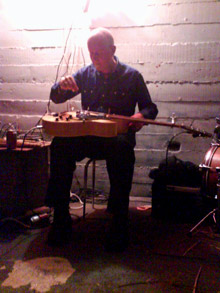
Cable #11 was a noisy, nasty, wonderful night of music held in a cramped bunker built during WWII by the Nazis. Homemade benches and tables. Homemade instruments too. The soirée was organized in part by Will Guthrie, an Aussie and Nantes resident whom I saw perform at Pannonica a few months ago.
Keith Rowe and Ben Patterson showed early on that this was going to be a special night. Their set was, at once, medical, visceral, and abstract. They sat at a card table and scraped rocks across rocks, sometimes knocking them together, occasionally employing the amputated neck of an electric guitar with a motorized toothbrush sitting atop the strings. Everything was closely mic’d and reverbed. The smallest movement of the stones on the table created sounds that made the bones in my chest vibrate. I imagined steps down a corridor to a giant morgue or boulders falling in a deep crevasse. The duo performed two pieces in one stunning half-hour burst. I love how experimental music can bring your focus back to essentials; in this case, I rediscovered my appreciation for the simplicity and power of rotation, vibration, and friction as musical agents.
Next, Fabrice Favriou unleashed a distortion fetishist’s dream: a 30-minute screed where the dude recorded the carnivorous feedback from his guitar with pedals and then looped the shit over top of new noise he made by jamming a wire brush from a drumkit across the pickups. His show had a nice crest and release that finished with some pecking at a cymbal with the headstock of his guitar. I must emphasize the violence of the sound and technique here: halfway through the set, I could no longer hear and he was no longer holding his ax like it was an instrument. It was swinging in front of him, parallel to the ground. It looked like he was holding his guts in.
The best act of the night was Anthony Pateras / Sean Baxter / David Brown, a trio of Aussies that improvised on prepared piano and guitar and drums. The music was somehow raucous and sophisticated all at once, and the dynamic tension among the three was fascinating to watch.
The oldest member of the group sat in the middle and tweaked the prepared strings of his polished guitar with the precision of an acupuncturist. He remained stoic throughout the set. The men to his right and left, however, let fly. For a while I thought the pianist had even taken the strings completely out of his instrument. In fact, he had loaded that baby with handfuls of common bolts and screws which somehow yielded tones remarkably similar to those from an African mbira. I loved his playing style: he often looked more like a furious stenographer than a pianist, his fingers typing madly over each other at the high end of the keyboard. He used the butt of his palm to mash rows of keys at once. The playing, however, was passionate without being wayward. It was the perfect counterpoint to the broad poise of the guitar and the childlike violence taking place on the drumkit a few feet away.
The drummer used a large set of wind chimes as “drumsticks” and simply pulverized his kit with them. He shoved the chimes into the drums, as if they were long metal pills to be swallowed by the drums’ flat mouths. His foot was always on the kick pedal, sending agitated rolls of bass tone through the cacophony spilling out above them. At one point his drumsticks were actual sticks (like from trees), which he broke and dropped onto the drums from two feet above.
In the last piece, he used tin flatware to attack his drums. After several minutes of battering breadpans and platter covers, the piece reached its dramatic peak as he cracked a plastic plate with agonizing slowness.1 He and the pianist often looked at each other as they played: the pianist’s head bobbed; the drummer’s eyes widened with what looked like the fierce hope that he could keep assaulting his kit all night.
The final set came courtesy of Brit Tim Goldie, who poured beer on himself, struck kung-fu poses, put a snare drum over his face and screamed through the surface of it, and generally did his best to torture us with acute metal-on-metal screeches. It was a fittingly discordant end to a night that was altogether beautiful thanks to the originality of its attendant terrors.
1This, to me, was amazing. P, B, & B had developed the tension in this piece so thoroughly that a room full of people was fucking {mesmerized by a guy bending a plate. This is the only thing that was happening. No guitar, no mad piano. Just a man and his bare hands and a Frisbee. And it was musical.}